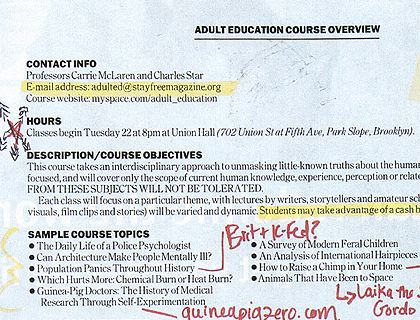
So Richard Baraniuk’s talk on the Open Education Revolution was as good as I expected. And Richard himself perpetuated a trend I have been delighted to notice in this field, which roughly stated is that the more impressive and more accomplished the person, the more easygoing and devoid of ego they tend to be…
I have followed the Connexions Project for some time, so I was mostly familiar with the components of Richard’s presentation. But two revelations jumped out at me:
* That Connexion’s robust digital-to-print conversion features combined with advances in print-on-demand technology have allowed Rice University Press to rise from the ashes — perhaps there is a future for University publishing houses that is at least borderline sustainable.
* A legitimate criticism of the open education movement is that it favours institution-centric practice. Richard shared the story of a Houston-based music teacher whose innovative methods for teaching music theory in a typical year might reach the 15 or 20 students she was able to work with in person. Through Connexions, she has been able to reach a genuinely vast audience (Richard cited a total of 7.2 million views). And apparently her work is incorporated into public education syllabi around the world, including some in Mongolia. To me, a story like that suggests the potential of open education might genuinely be “revolutionary”.
I recorded audio of the session, though it’s not especially good quality. There was also some professional recording of audio and video done, hopefully I will be able to upgrade what is here soon.
This is an 11 minute excerpt from the Q&A, in which we discussed the hard realities of getting adoption of open courseware in a higher ed setting:
play_blip_movie_608922();
And here is the unedited audio of the session:
play_blip_movie_609057();
So between the session and other conversations I’ve been having lately (as well as some welcome indications of support from higher-ups here at UBC), I was beginning to feel some new motivation to make another push to get some kind of open courseware project rolling.
Then, last night, I was doing a round of web-trolling and came across this article by one of my heroes, Canadian copyright maven Michael Geist. Geist notes the success of the MIT OpenCourseWare initiative (Stephen Downes queries the numbers being bandied about), and the global reach of the OCW Consortium (it’s worth checking out the comments on Geist’s blog) — then he tears into a notable gap:
Yet it is also a story in which Canada is largely absent. The sole Canadian participant in the Open Courseware consortium is Capilano College, a relatively small school with 6,700 students located in North Vancouver, British Columbia. The rest of Canadian higher education — Toronto, York, UBC, Western, Alberta, Queen’s, Ottawa, McGill, Dalhousie, Waterloo, and dozens more — are inexplicably missing in action.
Failure to lead
While collective agreements may restrict the ability to mandate participation, every Canadian university should be able to identify a handful of professors willing to freely post their course materials so that the 10-course minimum can be met. Indeed, it is an initiative in which everyone benefits — enhanced reputation for the participating professors, name recognition and student recruitment for the institutions, and new access to knowledge for Canadians from coast to coast.
Canadians pride themselves in being one of the world’s most connected countries; however, the failure to lead on issues such the Open Courseware consortium and open access to the results of Canadian research suggests that we are still struggling to identify how to fully leverage the benefits to education of new technology and the Internet. Many of Canada’s top universities may liken themselves to MIT, but the near-total absence of Canada from the Open Courseware consortium suggests that there is still much to learn.
To which I can only reply… “OUCH!”
As an aside, while it is wonderful that Capilano College is moving in this direction, a half hour of investigation and emailing made it clear that as of now the extent of their activities is some internal discussion, and a pilot eduCommons page that is hosted by Utah State’s COSL, with no courses or content as yet. If that’s the standard for inclusion in the OCW Consortium, UBC might fairly claim to have gotten there more than two years ago.
If that sounds snarky, it isn’t meant to, really. I know all too well that the hard work is identifying willing faculty and other community members, getting the policy (especially IP) questions cleared up, having some kind of technical infrastructure and support in place. And you need to simultaneously engage the grassroots and get buy-in from the upper reaches of the institution’s administration. There are so many chicken-and-egg dilemmas that planning discussions often resemble a stoner study group in a poorly moderated philosophy class…
Yet a confluence of factors has me feeling oddly motivated to stir things up. In the recent past, I’ve argued that getting stuff up on the open web with an open license was enough. But the discussions I’ve been having here have me thinking there might be value in a more formal and programmatic approach. And I find myself wondering what it would really take to scrape ten decent open online courses together… (I wish it was as simple as Geist suggests.)
So I’m going to be making proposals around campus, drawing on the resources available on the OCW Consortium site (any other resources I should know about?)…
More importantly, I intend to contact as wide a range of people as I can here to get a sense of interest in the on-campus community. So if you are at UBC, don’t be surprised if you get an email. (And don’t be afraid to contact me!) And as much as I love to deride Facebook activism, I might see how useful it is to set up a FB group to gather and inform interested parties.
Few things are more invigorating than embarking on an impossible task. Anybody else up for tilting at some windmills?








